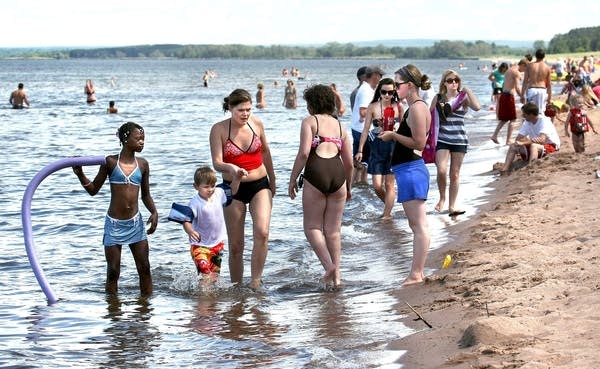Lake Superior reaches record temp
Go Deeper.
Create an account or log in to save stories.
Like this?
Thanks for liking this story! We have added it to a list of your favorite stories.

On another muggy August afternoon in Duluth, the Park Point city beach is again packed.
Clara Goellner is one of the three life guards trying to keep an eye on the mob of teens and children splashing away in water that's typically bone-chilling.
But this year, the normally uncomfortably cool surface waters of Lake Superior aren't so cold, as summer heat is showing up in one of the Minnesota's colder places. Experts say the lake's surface temperatures set a new record high this week -- and the entire lake likely is warmer than ever recorded.
"It's extremely warm," Goellner said. "It's about 70 every day -- really big crowds, even on weekdays."
Turn Up Your Support
MPR News helps you turn down the noise and build shared understanding. Turn up your support for this public resource and keep trusted journalism accessible to all.
At Park Point, it's not just little kids in the water. A squad of teenaged cheerleaders practices lifts hip-deep in the water.
This is Goellner's third year guarding the beach, and she knows warm water isn't the norm.
"Normally you have to wait until the wind is in the right direction for the warm water to be coming in, and you have to wait until August, 'cus, it takes that long for the lake to warm up," she said. "But now it's been really warm even in July."
On Tuesday, the waters atop Lake Superior reached the highest temperature ever recorded. The lake-wide average surface temperature hit 68.3 degrees. The average for Aug. 10 is just 55 degrees.

The keeper of those records is Jay Austin, an associate professor of physics at the University of Minnesota Duluth's Large Lakes Observatory. He's observed record warmth in both lakes Superior and Michigan, with Huron and Erie both quite warm as well.
Is this year's record the result of global warming? Maybe, but not directly, he said.
Austin said Lake Superior's warm up started last winter, which was largely ice free. As a possible cause, he points to the recurrence of El Niño, a large-scale atmospheric pattern that creates wind shear and instability, the result of warming in the Eastern Pacific.
"Really what we think is going on -- I think we're fairly confident of this -- is 2009 was a very strong El Niño year," Austin said. "And that El Niño year led to a year at least on Superior where there was very little ice.
"It allows the lake to warm up a lot more quickly, a lot more early than it would normally," he said.
Austin said the Minnesota end of the lake will continue warming for the next week or two. It won't be clear whether the entire lake -- top to bottom -- has set a new temperature record until underwater sensors are pulled up for the season in September.

Should beachgoers expect more of the same? Researchers think so.
Tom Johnson, a professor of geological science at the Large Lakes Observatory, avoids slapping blame for this year's heat on long-term global warming.
"I don't look at this summer and say 'aha, we have a hot summer and therefore it proves that global warming is happening,'" he said.
At the same time, Johnson said the long-term trend is clear. Warmer winters are affecting Lake Superior and are consistent with global trends.
"I look at the last 30 years and say 'man, we've had a lot of very warm years in the last 30 years.' " He said. "And that to me says we're looking at a trend that is very consistent with what the climate community is predicting."
Researchers say the trend for several decades now is clear -- ice is forming later on Superior, going out earlier, and like this year, allowing the lake to warm earlier and longer.
Although the warm water is great for swimming, it probably does not do much to a lake's fish, said Ted Halpern, assistant area supervisor of Lake Superior fisheries for the state Department of Natural Resources. His office overlooks the big lake's shoreline north of Duluth.
Consider the lake's top predator, the lake trout. Halpern said lake trout don't like warm water, but he said there's still a lot of cold water out there.
"Because there's so much deep water out there it's really just a question of them moving half a mile or a mile or two off shore during the hottest weather and they can still get to very cold water," he said.
But, there are several unknowns should warm water become the norm, like how the heat affects the trout's favorite foods, lake herring and smelt. Still, Halpern said a warming climate would hit inland lakes sooner and harder than it would big cold Lake Superior.
Dear reader,
Your voice matters. And we want to hear it.
Will you help shape the future of Minnesota Public Radio by taking our short Listener Survey?
It only takes a few minutes, and your input helps us serve you better—whether it’s news, culture, or the conversations that matter most to Minnesotans.






